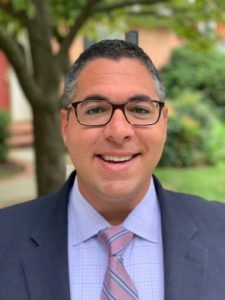-
10 June 2020

 When stay-at-home orders were put in place throughout Greater Washington in mid-March, the purpose was to protect individuals against the coronavirus pandemic. But for victims of domestic violence, at-home isolation felt less like a means of protection and more a source of danger.
When stay-at-home orders were put in place throughout Greater Washington in mid-March, the purpose was to protect individuals against the coronavirus pandemic. But for victims of domestic violence, at-home isolation felt less like a means of protection and more a source of danger.
“Our services were essential before, but they’re vital now,” says Staff Attorney Jacob Ravick about the organization he works for, the Jewish Coalition Against Domestic Abuse (JCADA). Jacob explains that, when a person is in an abusive relationship, there are usually opportunities for them to find relief by leaving the house. “[But] now, they’re being told to lock down and quarantine with their abusers. So a call to JCADA might be the only avenue that they have to ask for help.”
Even as the pandemic forced JCADA, a Federation partner agency, to move to a remote working environment, the organization has continued to provide uninterrupted services for people in need—which is crucial, because “domestic violence organizations are seeing an increase in calls across the board during this time,” Jacob says. “I am so proud to work [for an organization] where services continue uninterrupted.”
JCADA offers a variety of resources and options for support for individuals experiencing intimate partner violence, from empowering them to leave the relationship and find emergency shelter to helping them obtain childcare and employment. A primary part of Jacob’s portfolio is to work within the judicial system on behalf of his clients to obtain a protective order against their abuser. Over the past few months, Jacob has transitioned from meeting clients at the office or courthouse to conducting all of his work from home over the phone. Essentially every day, he has remote hearings, where he petitions a judge to find in favor of his client.
“The judge calls me, I call the client, and we get the protective orders they so desperately need,” Jacob says. “We’ve helped clients obtain protective orders where the abuser was ordered to vacate the home, which, during the pandemic, is incredibly important.”
Jacob notes that his clients often feel a tremendous sense of relief and offer outpourings of gratitude for JCADA at the end of this process. And he feels grateful for the opportunity to make a difference in people’s lives and for his community, especially during a time of crisis.
He has lived his whole life in suburban Maryland; he attended and met his wife at Charles E. Smith Jewish Day School (their two children attend CESJDS, which, he says, “has been amazing with the distance learning”) and he is a lifelong member of B’nai Israel Congregation.
“I am a product of this community,” Jacob says. “The value of tikkun olam (repairing the world) was deeply engrained [in me] from a young age. At JCADA, we really strive to repair the world through our work to end power-based violence. That’s a pretty strong guiding principle for us.”
JCADA also stresses the importance of maintaining the personal health and wellbeing of the staff members. “There’s an expression that I’ve always liked: ‘Don’t crash the ambulance.’ If the ambulance crashes, [it] can’t help other people,” Jacob says. “We at JCADA place an extreme emphasis on self-care so we can better serve the community.”
Jacob has also drawn strength during these difficult times from his family and community. Since entering quarantine, he has taught both of his small children how to ride bikes. He has participated in Shabbat services over Zoom. He made a bonfire in his driveway to celebrate Lag B’Omer, the joyous holiday in the middle of the seven-week period of mourning after Passover. He and his wife joined his children for an Israeli dance party, which was organized by CESJDS.
He has been impressed with the way the community has innovated to continue offering programs and opportunities for people to engage with one another even while remaining physically distant. And he is continually impressed with his organization and his colleagues for the way they have adapted to these new circumstances to continue to provide critical services for victims of domestic abuse.
JCADA has also continued to offer trainings virtually so individuals and institutions can work together to eradicate power-based violence.
“We need to come together as a community to work together to take care of one another,” Jacob says. “[That] is something we need to remember [after the pandemic is over].”
The Jewish Federation is proud to partner with JCADA to serve those in need within Greater Washington. As our community continues to weather the coronavirus pandemic and its ensuing challenges, the support of donors to Federation’s Annual Campaign ensures that our human service agencies and other partner organizations are equipped to meet the needs of those they serve—and to be agile in their work during this time of crisis.
